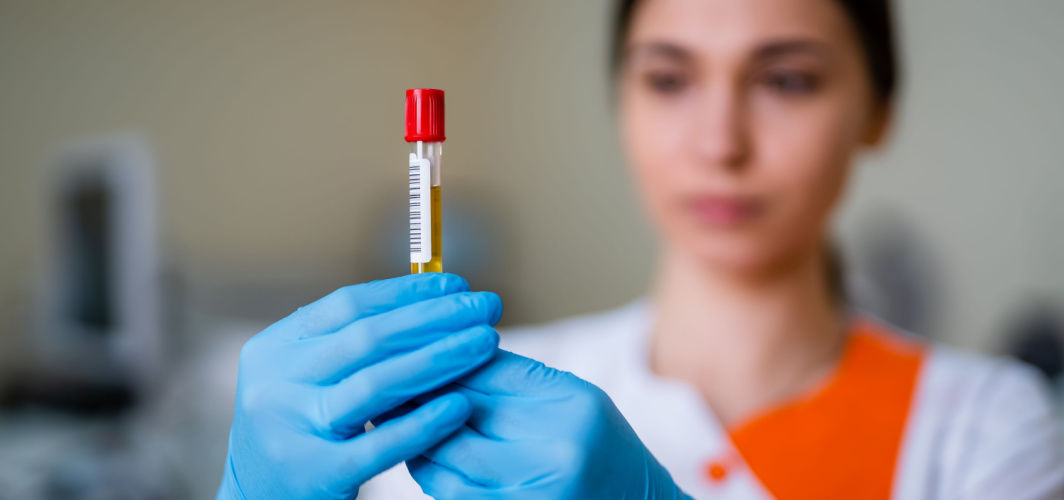General Health
Feeling Bloated or Noticing Changes in Urination? Know How a Creatinine Test Checks Your Kidney Health
6 min read
By Apollo 24|7, Published on - 29 May 2025
Share this article
0
0 like
.jpg?tr=q-80)
Have you been experiencing persistent bloating, swelling, or changes in urination? These symptoms could be linked to kidney health, and one of the most effective ways to assess kidney function is through a creatinine test.
Creatinine is a waste product produced by muscles during normal activity. Healthy kidneys filter creatinine out of the blood and remove it through urine. However, when kidney function declines, creatinine levels rise, signalling potential kidney disease or dysfunction. In this article, we’ll explore what a serum creatinine test is, how it helps assess kidney health, when it’s recommended, and how to interpret the results..
What Is a Serum Creatinine Test?
A serum creatinine test is a blood test that measures the level of creatinine in your bloodstream. Creatinine is a waste product produced by your muscles during normal metabolism. Under healthy conditions, your kidneys filter creatinine out of the blood and remove it through urine.
When kidney function declines, creatinine builds up in the blood. Measuring serum creatinine levels helps doctors evaluate how well your kidneys are working and can be an early indicator of kidney disease or other issues affecting kidney function.
Key Conditions Linked to Elevated Serum Creatinine Levels
Elevated serum creatinine levels often indicate kidney dysfunction, but they can also be influenced by other health conditions. Some common causes include:
- Chronic Kidney Disease (CKD) – A progressive decline in kidney function that leads to reduced creatinine clearance.
- Acute Kidney Injury (AKI) – A sudden loss of kidney function due to dehydration, infections, or medication toxicity.
- Diabetes – High blood sugar levels can damage kidney structures, leading to impaired filtration.
- High Blood Pressure (Hypertension) – Increased pressure on the kidney blood vessels can reduce their ability to filter waste.
- Urinary Tract Obstruction – Blockages from kidney stones, tumours, or an enlarged prostate can interfere with creatinine elimination.
- Dehydration – Insufficient fluid intake can temporarily raise creatinine levels by reducing kidney filtration efficiency.
- Heart Disease – Poor circulation can affect kidney function, leading to elevated creatinine.
- Muscle Disorders or Injury – Excessive muscle breakdown releases more creatinine into the bloodstream.
- Certain Medications – Drugs like NSAIDs, antibiotics, and chemotherapy agents can impair kidney function and raise creatinine levels.
When Your Doctor May Recommend a Serum Creatinine Test
A serum creatinine test is commonly ordered to evaluate kidney function and detect potential issues early. Your doctor may recommend this test if you:
- Show symptoms of kidney disease, such as swelling, fatigue, changes in urination, or persistent high blood pressure.
- Have diabetes or hypertension, as both conditions can lead to kidney damage over time.
- Experience nausea, muscle cramps, or unexplained weight loss, which may indicate impaired kidney function.
- Require pre-surgical evaluation or medication monitoring, especially for drugs that affect kidney function.
- Have a family history of kidney disease or are over 60 years old, since kidney function naturally declines with age.
Have more questions?
How to Prepare for a Creatinine Blood Test
Preparing for a creatinine blood test is simple, but following a few guidelines ensures accurate results:
- No fasting is required. You can eat and drink normally before the test.
- Inform your doctor about medications – Certain drugs, such as NSAIDs and antibiotics, may affect creatinine levels.
- Stay hydrated. Drinking plenty of water helps ensure smooth blood collection.
- Avoid excessive protein intake. A high-protein diet can temporarily raise creatinine levels.
- Discuss recent medical conditions. Dehydration, infections, or muscle injuries may influence test results.
What to Expect During the Creatinine Blood Test Procedure
The creatinine blood test is a routine procedure that involves a simple blood draw and typically takes only a few minutes. Here’s what happens:
- The skin is cleaned with an antiseptic to prevent infection.
- A tourniquet is applied to make the vein more visible.
- A small needle is used to draw blood into a vial.
- You may feel a quick sting or mild discomfort during the process.
- Once the sample is collected, the needle is removed, and a bandage is applied.
- The blood sample is sent to a lab for analysis.
- The entire procedure is quick and requires no downtime.
What Do My Creatinine Blood Test Results Mean?
Your serum creatinine level is measured in milligrams per deciliter of blood (mg/dL) and helps evaluate how well your kidneys are filtering waste. Because creatinine comes from muscle activity, results can vary depending on your age, sex, and muscle mass. People with more muscle tend to naturally have slightly higher creatinine levels.
Normal Creatinine Levels
For most healthy adults, typical reference ranges are:
- Men (18–60 years): 0.9 to 1.3 mg/dL
- Women (18–60 years): 0.6 to 1.1 mg/dL
- Adults over 60: Levels tend to remain similar but may slightly decrease due to age-related muscle loss.
What a High Creatinine Level May Indicate
If your creatinine level is elevated, it could suggest that your kidneys are not functioning properly. Some common reasons for increased levels include:
- Kidney disease or damage
- Blockage in the urinary tract (e.g., kidney stones or an enlarged prostate)
- Dehydration
- A high-protein diet
Reduced blood flow to the kidneys, which may result from conditions like congestive heart failure, shock, or complications of diabetes
If your creatinine level is high due to an acute or chronic kidney condition, it usually won’t improve until the underlying problem is treated. However, if the increase is caused by temporary factors, such as dehydration, intense exercise, or dietary protein or supplement use, levels often return to normal once those triggers are addressed.
What a Low Creatinine Level May Indicate
Low creatinine levels are much less common and are usually not a cause for concern. They can occur due to:
- Reduced muscle mass, from ageing, malnutrition, or chronic illness
- Certain medical conditions that affect muscle tissue
- In most cases, low levels do not indicate a kidney problem but may prompt your doctor to look at your overall nutritional and muscular health.
Managing Elevated Serum Creatinine Levels
High serum creatinine levels often indicate kidney dysfunction, but they can also be influenced by dehydration, medications, or muscle-related conditions. Management typically involves:
- Identifying the Cause – Doctors assess underlying conditions such as chronic kidney disease (CKD), dehydration, or medication effects.
- Lifestyle Modifications – Increasing hydration, reducing protein intake, and avoiding nephrotoxic medications can help lower creatinine levels.
- Medical Treatment – If kidney disease is present, treatment may include medications to control blood pressure, diabetes, or electrolyte imbalances.
- Dialysis in Severe Cases – If kidney function is significantly impaired, dialysis may be required to remove excess creatinine and waste products.
- Regular Monitoring – Routine kidney function tests help track creatinine levels and guide treatment adjustments.
Conclusion
A creatinine test is an essential tool for evaluating kidney function, enabling early detection of potential issues and guiding appropriate treatment decisions. If you experience bloating or changes in urination, consulting a doctor and undergoing this test can provide valuable insights into your kidney health and the necessary next steps.
General Health
Frequently Asked Questions
What is a creatinine blood test used for?
What is a creatinine blood test used for?
What are normal creatinine levels?
What are normal creatinine levels?
What causes high creatinine levels?
What causes high creatinine levels?
How can high creatinine levels be managed?
How can high creatinine levels be managed?
Do I need to fast before a creatinine blood test?
Do I need to fast before a creatinine blood test?
Leave Comment
Recommended for you

General Health
Leukaemia: Types, Causes, Symptoms, Diagnosis, Treatment
Leukaemia is a form of blood cancer that causes abnormal cell growth in your body. Leukaemia has two types and four main classifications. The factors affecting leukaemia include your age, gender, medical history etc. It can be diagnosed through a physical exam or blood tests.
.jpg?tr=q-80)
General Health
What Does The CBC Test Mean?
A Complete Blood Count is a blood test used to diagnose various diseases. A CBC test report provides details of levels and characteristics of different blood cells, to help diagnose conditions like anaemia, infections, and blood cancers. Read on to learn more about CBC test uses and its procedure.

General Health
Shingles Diet: Essential Foods To Eat And Avoid
foods to avoid with shingles, foods to eat with shingles, shingles diet
Subscribe
Sign up for our free Health Library Daily Newsletter
Get doctor-approved health tips, news, and more.
Visual Stories

Plant-based Foods That Are a Great Source of Iron
Tap to continue exploring
Recommended for you

General Health
Leukaemia: Types, Causes, Symptoms, Diagnosis, Treatment
Leukaemia is a form of blood cancer that causes abnormal cell growth in your body. Leukaemia has two types and four main classifications. The factors affecting leukaemia include your age, gender, medical history etc. It can be diagnosed through a physical exam or blood tests.
.jpg?tr=q-80)
General Health
What Does The CBC Test Mean?
A Complete Blood Count is a blood test used to diagnose various diseases. A CBC test report provides details of levels and characteristics of different blood cells, to help diagnose conditions like anaemia, infections, and blood cancers. Read on to learn more about CBC test uses and its procedure.

General Health
Shingles Diet: Essential Foods To Eat And Avoid
foods to avoid with shingles, foods to eat with shingles, shingles diet